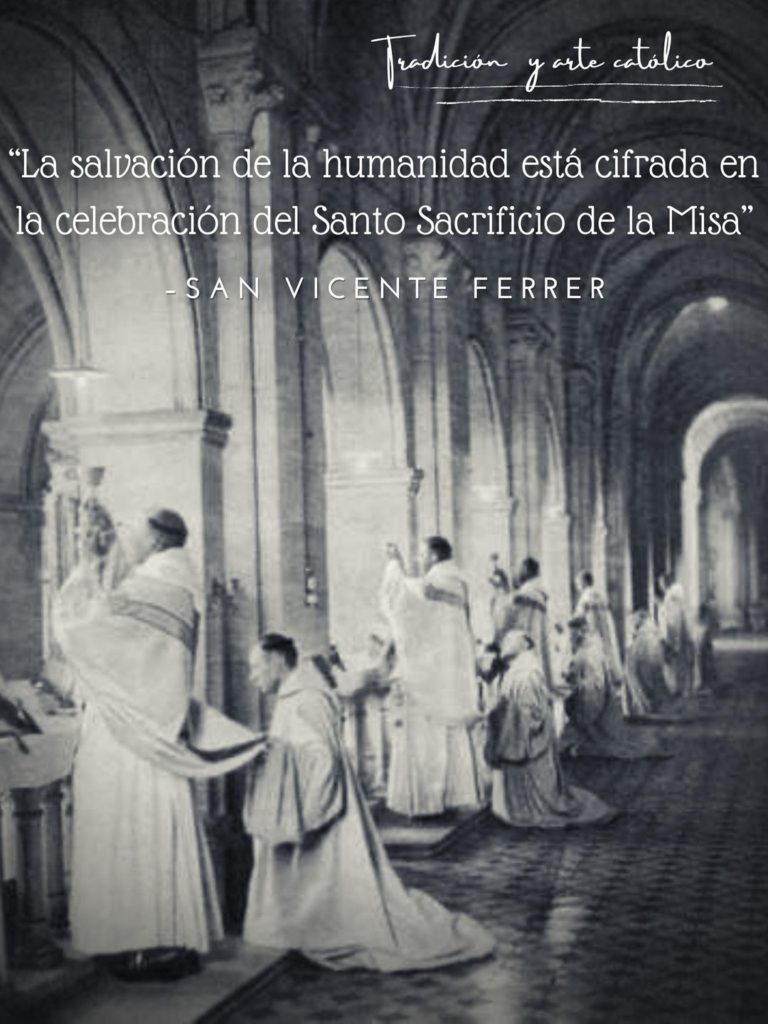It was time to get off FB and “come home”. I will be removing our posts from FB (Understanding the Theology of the TM) and re-posting them here on this page.
February 8, 2021
Truly it is the Mass that counts! It is the vehicle of grace most detested by Satan; the channel of grace which does make a soul simple, childlike, docile to inspirations of grace, wise, and discerning of spiritual dangers! But one must attend devoutly and with piety. One may think of the older generation, many of whom came to dislike the Old Mass, yet they grew up with it! It makes one tremble with holy fear lest we, too, develop an air of indifference and thus, go off searching for novelties.
“The salvation of humanity is mysteriously encoded in the celebration of the Holy Sacrifice of Mass; all the efforts of the wicked antichrist will be directed toward the removal of this Holy Mystery from Holy Mother Church in which the precious Body of Jesus Christ is managed through the memorial of his Sacred Passion; being that it is through this [vehicle of grace] that faithful Christians of a good life – even if ignorant and without science – they will be able to discern the cunning and the malices of the evil antichrist and his followers.”
– St. Vicent Ferrer
_________________________________________________
Says the Angelic Doctor, St. Thomas Aquinas, that the effects caused by devoutly assisting at the holy Sacrifice of Mass are as follows:
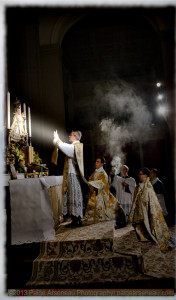 -Resist bad thoughts.
-Resist bad thoughts.
-Destroy sins ( and helps us avoid them).
-Mitigate the concupiscence of the flesh.
-Give the soul strength to battle enemies.
-Forgive venial sins.
-Purify, cleans and purge the heart.
-Encourage to do good.
-Increase chastity.
-Increase the fervor of charity.
-Give strength to suffer adverse things
-Fill the soul with all virtues.
Remember, though, that the soul has to prepare well to assist with piety and devotion. A lukewarm soul, or someone who does not prayerfully prepare to stand with Our Lady at the foot of Calvary, and who without much thought goes through a routine of reception of Holy Communion, will not greatly benefit from the Mass nor from Communion, and worse, might even incur the wrath of God! Let us take the example of the great saints, some who would prepare well ahead for their next Communion. Then, before going up to Communion, ask Our Blessed Mother to clothe your soul in her most beautiful garments of virtue and grace, and also to allow you to posses Her Immaculate Heart to present to our Eucharistic Lord. Ask of the Holy Ghost, and He will surely inspire you with other such sentiments which can make of you a saint, if only you cooperate with His grace.
_________________________________________________
______________________________________________________
Some people wonder why there is so much unhappiness and even broken marriages and wayward children among some families of practicing, traditionalist Catholics. Could the answer possibly lie in the reception of lukewarm Communions; in totally inadequate preparations to receive Him before whom the angles themselves tremble in awestruck love and adoration?
The following quote which gives us pause to ponder, is taken from the book THE HOLY COMMUNION, by Fr. John Bernard Dalgairns, 1903. The reference given is Viva, Dam. Prop.23, Alexander VIII:
“They who frequently communicate without actual love and without devotion…often do not show more fervor in their conduct…also, because habits of grace and charity do their work immediately through actual graces which are not given to indevout communicants.”
He adds, “When communions are indevout, no penitent ought to be allowed to communicate frequently. The actual graces peculiar to the sacrament are wasted…..I cannot think that daily communion, by any physical or fatal necessity, ensures devotion. This is not God’s way. Devotion does not drop from the clouds, nor does grace make its way into a soul which willfully puts an obstacle to it. Let us never forget that we must do something on our part to obtain these dispositions, and moreover, that they are necessary.”
“Let us recollect what has been already said about the necessity for actual grace to enable us to make any use whatever of habitual grace…habitual grace, though it remains permanently in the soul, requires the constant aid of actual graces to excite it to action and that without the continual influx of these graces from heaven it lies inactive within us. “
The actual quote in the book continues with this admonition: “And because tepidity and the want of actual aids from God negatively dispose the soul to a grievous fall, therefore, carelessness in this respect is very dangerous, for it disposes to grave falls, and often brings down the curse of God.”
____________________________________________________
____________________________________________________
“Reverence in church, especially in the presence of the Blessed Sacrament must be also our chief exterior virtue. This respect is the solemn profession of our faith and, at the same time, a grace of piety and fervor; for God punishes irreverences committed in His sanctuary with a weakening of faith and a withdrawal of graces of devotion.
There has been a catastrophic loss of faith since after Vatican II. The quote above by the Saint of the Blessed Sacrament, St. Peter Julian Eymard, explains why, in great part, that has happened. The Sacrifice of the Mass (Novus Ordo) became human-centered, and our Lord was relegated to second place after the “presider”, while the people talked, applauded, laughed, shook hands with one another and in short, celebrated themselves. See, the saint says that such behavior is punished by God with a weakening of the faith.
How sad it is to be punished by God while not realizing one is being punished!
____________________________________________________
____________________________________________________
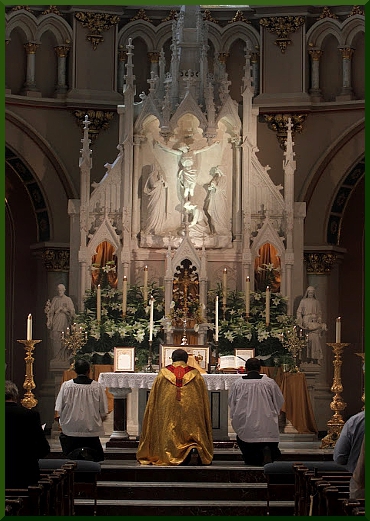 “The Spirit of evil fears nothing as much as a Mass, more so when it is celebrated with great fervor and when many [souls] unite themselves to it in a spirit of faith. When the Enemy of the good runs into an insurmountable obstacle, it is because in some church, a priest conscious of his own weakness and poverty, has offered the Omnipotent Host and the Redemptive Blood. It is necessary to remember that there have been saints who while assisting at Mass, at the time of the elevation of the Chalice, have seen the Precious Blood overflowing and running down the arms of the priest, while angels come to collect It in gold cups to take it to those who have the greatest need of participating in the mystery of the Redemption.”
“The Spirit of evil fears nothing as much as a Mass, more so when it is celebrated with great fervor and when many [souls] unite themselves to it in a spirit of faith. When the Enemy of the good runs into an insurmountable obstacle, it is because in some church, a priest conscious of his own weakness and poverty, has offered the Omnipotent Host and the Redemptive Blood. It is necessary to remember that there have been saints who while assisting at Mass, at the time of the elevation of the Chalice, have seen the Precious Blood overflowing and running down the arms of the priest, while angels come to collect It in gold cups to take it to those who have the greatest need of participating in the mystery of the Redemption.”
____________________________________________________
____________________________________________________
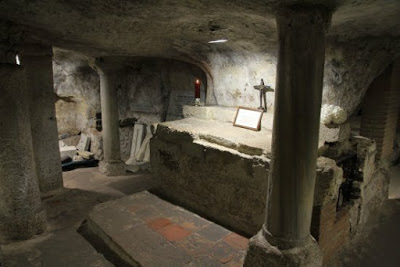 In the days of the catacombs, Mass was celebrated over the tombs of the martyrs. This photo is of the tomb of St. Antiochus, (r.i.p. C. 127 A.D.) in Sardenia, over which Mass was celebrated.
In the days of the catacombs, Mass was celebrated over the tombs of the martyrs. This photo is of the tomb of St. Antiochus, (r.i.p. C. 127 A.D.) in Sardenia, over which Mass was celebrated.
My loose translation, from the blog “messainlatino”: The Mass facing the people was first espoused by some members of the liturgical movement, such as the monk Lambert Beauduin, who, however knowledgeable in liturgical history, never said that Versus Populum was the ancient position as some modernists claim.Versus Populum was introduced to give the liturgy a certain note of community with “warmth and familiarity”. But in doing so Beauduin and his friends did not realize that the liturgy was being further clericalized in a nauseating and unacceptable manner.”A celebration of “people-facing” never existed.”Mass facing the people, is therefore the daughter of clericalism that sees the priest as the center of all liturgical action that is then defined according to the priest’s place and his orientation.It is therefore an aberrant expression that arises from an objectionable concept of liturgy.
____________________________________________________
____________________________________________________
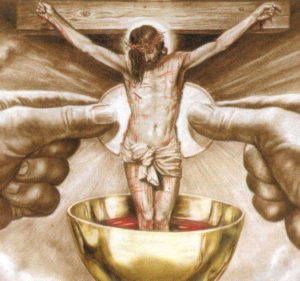 Cardinals Ottaviani and Bacci said the same thing.
Cardinals Ottaviani and Bacci said the same thing.
“After the institution of the New Mass in 1969, the priests have lost their compass. If you take away the Mass, then you take away the essence of the priesthood. You cannot define what the priest is without sacrifice. And you cannot discuss what sacrifice is, unless you actually have a priest who is doing it.
“[W]ith the New Mass, this, the idea of the sacrifice and the sacrificing priesthood was done away with. The New Mass is a complete change of theme, even.”
– Fr. Adam Purdy, SSPX
____________________________________________________
____________________________________________________
Anonymous traditionalist priest – a priest with whom this author has corresponded – writes: “The advent of widespread literacy and the production of cheap mass-produced books a century and a half ago made it possible to encourage the faithful to follow the texts of the prayers of the Mass by reading missals of their own. This became the approved norm and the subsequent introduction of microphones in church in order to facilitate ‘active’ participation in the text of the prayers of the Mass radically changed the ethos of liturgical worship.”

” ‘Participate’ – the cant word – does not mean to make a row as the Germans suppose. One
participates in a work of art when one studies it with reverence and understanding.”
– From the diaries of Evelyn Waugh on the priest and “participation”
The ceremonies themselves are actions which convey a sequence of mystical events in the re-presentation of Calvary. Understanding this, indeed, makes it possible to penetrate with the heart, mind and soul into the mystical significance of the greatest of miracles transpiring before our eyes.
Father Anonymous continues by saying that in understanding the symbolism of the ceremonies of the Mass, the soul may then, “compose its own meditations according to the response of its heart and thereby be free to contemplate the Sacred Action of Holy Mass…”
Evelyn Waugh , (instrumental, with Sir Arnold Lunn and Hugh Ross Williamson, in founding the Latin Mass Society in 1965) who was not at all happy with the direction liturgical reform was taking in the 1950’s, often times wrote to express his dismay regarding several things happening in the church at that time, one of which was the dialogue Mass: “‘Participation’ in the Mass does not mean hearing our own voices. It means God hearing our voices. Only He knows who is ‘participating’ at Mass. I believe, to compare small things with great, that I ‘participate’ in a work of art when I study it and love it silently. No need to shout. … If the Germans want to be noisy, let them. But why should they disturb our devotions?”
Waugh also wrote that, “When I first came into the church, I was drawn, not by splendid ceremonies, but by the spectacle of the priest as a craftsman. He had an important job to do which none but he was qualified for. He and his apprentice stumped up to the altar with their tools and set to work without a glance to those behind them. Still less, with any intention to make a personal impression on them.”
We would caution that the “splendid ceremonies” to which Waugh refers must not be disparaged. It could not have been the intention of Waugh to do so. It appears that he wanted to make the point that priest and laity have entirely different roles and that the laity should not attempt to usurp the clerical duties of neither priest and nor “apprentice” – a word most suited for “altar boy”.
____________________________________________________
____________________________________________________
 Imagine someone weak from hunger who is invited to a dinner, but when he presents himself at table, he, instead of thanking his host, and eating, gawks at everyone and everything and allows his thoughts to be diverted to the entertainment of trifling matters. Rightly would one call such a person a philistine – or worse.
Imagine someone weak from hunger who is invited to a dinner, but when he presents himself at table, he, instead of thanking his host, and eating, gawks at everyone and everything and allows his thoughts to be diverted to the entertainment of trifling matters. Rightly would one call such a person a philistine – or worse.
If we assist at Mass, it must be with faith and devotion since the priest makes special mention of those who do, praying for all present “whose faith and devotion are known to You.” Gueranger continues, “It is quite clear that the priest would never speak thus to God in behalf of such Christians as conduct themselves no differently in church than they would anywhere else, who are in no way preoccupied with what is going on at the altar, and who seem to have nothing else to do, but to distract themselves as far as they can, more or less respectfully.”
____________________________________________________
____________________________________________________
We will make one more post on the subject, adding our contribution to the debate, “Dialogue, or Not”. As laymen, we have no authority to dictate to the faithful what to do. HOWEVER, the known facts, convince us that the laity making the responses – whether High Mass, or Low is not a long-standing custom of the Church, but rather a more recent innovation, and therefore can be ignored by the traditionalist faithful who wish to participate silently at Mass. Here are the facts:
The Jugendbewegung was a German youth (Jugend) movement begun in 1896, which focused on outdoor activities for cultural and education purposes. For Catholic youth, the outdoor activities included Masses, and it is within this movement that Msgr. Klaus Gamber attributes the proliferation of the “dialogue Mass”.
With regard to the fabrication of the New Mass, he says, “Another source of the new Order…is that of the German Jegendbewegung and its DIALOGUE MASSES [our emphasis].” Gamber further states in the same book, The Reform of the Roman Liturgy, that “The use of responsorial prayers developed much later, during the dialogue Masses, which first came into use in the 1920s”.
Reference the older books on the Mass, such as St. Leonard’s The Hidden Treasure; Cochem’s Explanation of the Holy Sacrifice of the Mass; Gihr’s The Holy Sacrifice of the Mass: Dogmatically, Liturgically and Ascetically Explained, and you will find nothing that even comes close to advocating vocal responses to the priest by the laity as a means of participating. On the contrary, the older books counsel an interior attitude of recollection and offering of self together with Christ, as other “victims” at the hands of the sacrificing priest. The “dialogue” Mass is actually a subtle attack eroding the role which had traditionally been allotted to the laity: like Mary Magdalen, the laity during Mass were privileged with the better part, the part of silent contemplation. As Ven. Luis M. Martinez puts it, “Something sublime imposes silence.” The stigmatized saint Padre Pio actually advised that the faithful assist at Mass as did Our Blessed Mother – who stood silently at the foot of the Cross.
Continuing to quote Gamber, he wrote: “[f]rom the dialogue Masses came the practice of publicly reciting what were the priest’s private prayers. For example, the introductory rite used to be a dialogue between the celebrant and the ministri (the altar boys or Mass servers) at the steps of the altar while the choir sang the introitus. So too, were the responses, ‘Deo gratias and laus tibi, Christe, to the scriptural readings [which] IN THE TRADITIONAL ORDO [were] GIVEN ONLY BY ONE OF THE MINISTRI [our emphasis].”
If the dialogue Mass is of recent usage – as Gamber’s research reveals – and “In things relating to divine worship, St. Thomas makes use of the prescription and custom of the Church as a conclusive argument to refute various objections” [quoting Don Pietro Leone, pen-name of a priest], why would traditional Catholics wish to emulate the modern verbosity of the N.O?One last word: Please do not distort this post as advocating for the ‘mute’ spectator” at the TLM. Interior recollection, the uplifting of the heart, the awakening of a sluggish spirit, the longings and aspirations formed – these are all intense activities that demand one’s focus of heart and mind and soul, so much so, that often times, speaking only serves to perturb the silent, unseen, interior activity of one assisting at the holy Sacrifice of the Mass. The little book by St. Leonard de Port Maurice, The Hidden Treasure, is a gem of a book on how to best assist at Mass and to gain the most profit from the Holy Sacrifice. Any Catholic assisting at the TLM and following his admonitions cannot be considered by God as a mere silent observer, even were he to refrain from articulating any responses to the priest, as in the “dialogueMasses”.
____________________________________________________
____________________________________________________
Unlike a prayer service, the Holy Sacrifice of the Mass is an action in which the primary Figure is Christ Himself. About this, Cardinal Newman stated, “The Mass is not a mere form of words; it is an action, the greatest action that can be on earth, and hence, it is quite possible to take an intelligent part in it, and to be present not only in body, but with heart and soul, without uttering so much as a single word.” 
This is why dialogue responses from the faithful during the re-presentation of Calvary, are not necessary, and are often a distraction and irritation to others who wish to be absorbed into the Sacrificial Action, through silent meditation.
On this subject, a traditionalist priest has written in his church bulletin: “At High Mass, the choir makes all responses simply because that is their function. The congregation, on the other hand,, responds internally, as opposed to vocally, and this is still, according to Pope Pius XII in his encyclical “Mediator Dei, active participation. Active participation…does not necessitate vocal responses but unity of intent with the [priest]…”
____________________________________________________
____________________________________________________
“Similarly, an increased participation of the laity seemed like a good thing and we did not at first grasp its overtones of getting rid of the Hierarchy.  And so on. The pattern on which the post- Conciliar Church is being remodeled on the parochial level is pure Protestantism, but it took a long time for us to get wise to what was really happening because we didn’t know anything much about Protestantism and we were bedazzled by ‘ecumenical charity.'”
And so on. The pattern on which the post- Conciliar Church is being remodeled on the parochial level is pure Protestantism, but it took a long time for us to get wise to what was really happening because we didn’t know anything much about Protestantism and we were bedazzled by ‘ecumenical charity.'”
– Carol Jackson Robinson (1985) co-founder with Ed Willock, of the lay Catholic magazine, INTEGRITY
____________________________________________________
____________________________________________________
 In the Old Testament there were many pre-figurements and foreshadowings of the Blessed Sacrament and of the Holy Sacrifice of the Mass that would be fulfilled in the New Covenant. Some of these are:
In the Old Testament there were many pre-figurements and foreshadowings of the Blessed Sacrament and of the Holy Sacrifice of the Mass that would be fulfilled in the New Covenant. Some of these are:
1.) The Tree of life, planted in the center of Paradise (Gen. 2: 9);
2.) The sacrifice of Abraham, willing to offer his son Isaac by God’s command (Genesis 22:1-19);
3.) The Ark of the Covenant, made from the wood of the acacia [tree], in which the manna was kept (Ex. 16, 33-34; 25);
4.) The Proposition loaves of bread which were offered to God every Saturday on the Golden Table (Lev 24: 5-8);
5.) The bread baked under the ashes, with which Elijah [after having slept under a tree] was strengthened, enabling him to reach the Mount of God, Horeb (1Kings 19: 4-8).
As St. Thomas Aquinas says: “This sacrament is especially a memorial of the Passion of Christ; and it was appropriate that the Passion of Christ, by which He redeemed us, would be foreshadowed so that the faith of the ancients would be directed toward the Redeemer.”
- From the book Treatise of the Most Holy Eucharist, by D. Gregorio Alastruey, canon of the University of Salamanca, Spanish edition, 1951.
____________________________________________________
____________________________________________________
By assisting at Mass with greater devotion, not only the priest, but each individual in the pew is able to procure greater benefits from the Holy Sacrifice of the Mass. 
St. Leonard of Port Maurice: “[A]though the Mass is of infinite value, you must know, nevertheless, that God accepts it in a manner limited and finite,….the greater or less satisfaction applied by the sacrifice in our behalf, is determined by the greater or less perfection in the dispositions of him who celebrates, causes to be celebrated, or assists at the sacrifice…think of the folly of those …who assist thereat with little or no devotion….St. Thomas, [says] ‘that all sacrifices, as sacraments are equal in dignity, but they are not equal, however, as far as regards the effects that flow from them; hence, the greater the actual or habitual piety of the celebrant, the greater shall also be the fruit of the application of the holy Sacrifice…all this is equally applicable to those who assist at Mass.’ ”

